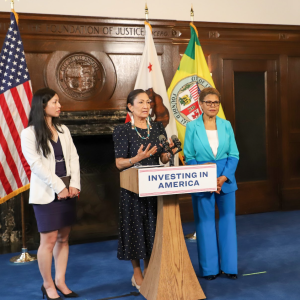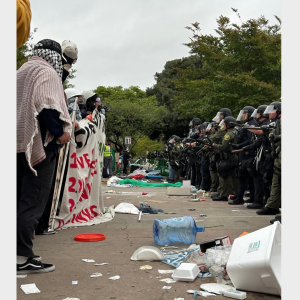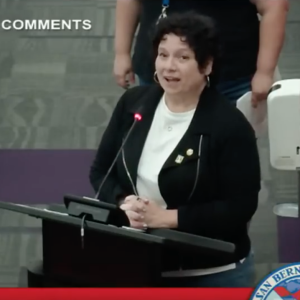 View Winners →
View Winners → Pasadena’s Occupancy Inspection Program to Undergo Significant Changes


Although highly unpopular, the OIP stands as one of the city’s only effective tools to formally identify and deter illegal additions/renovations that could otherwise go unreported during a property’s point of sale. – Photo by Terry Miller / Beacon Media News
City staff will develop methodology that ‘piggybacks’ OIP onto private third-party inspections; will return before council within 30 days
By Gus Herrera
On a night when budget discussions dominated the city council’s meeting agenda, it was an item that will change how real estate transactions are conducted in the City of Pasadena that ended up filling the seats.
A platoon of local realtors, many of whom sported a sticker that read “no illegal searches,” attended council’s latest regular meeting in hopes that the city’s occupancy inspection program (OIP) would be amended or scrapped altogether.
The program, which has drawn criticism from local realtor associations and the State of California alike, has been described as inconsistent, redundant, and anachronistic. Some realtors argue that the OIP holds up escrow, sometimes causing sales to fall through. While the State of California’s March 2016 audit revealed various deficiencies in the program – deficiencies that included inconsistency during inspections and a lack of follow-through once violations have been identified, according to Israel Del Toro, code enforcement manager.
Yet, as was revealed by council’s discussion, the program stands as one of the city’s only effective tools to formally identify and deter illegal additions/renovations that could otherwise go unreported during a property’s point of sale.
Adopted by the city’s board of directors in 1973, the OIP has not been updated since 1991 and remains “one of the most detailed” inspections, as compared to those of other cities in Los Angeles County, according to Del Toro. In fact, only 16 of the 88 cities in the county require some form of inspection at the point of sale, per city staff’s report.
Therefore, city staff recommended to council that the OIP be streamlined in the following ways: re-focus inspections on critical life/safety violations, allow self-certification for minor code violations, and exempt condominium/townhouse units from mandatory inspections.
City staff acknowledged that the need for the OIP has changed “significantly in the past 27 years” – improved housing stock, the prevalence of private third-party home inspections (typically initiated by the buyer and commonly required by lenders), and changes in technology have all exacerbated the redundancy of the city’s point-of-sale inspections.
Yet, once all the arguments had been heard, the council was split. Council Members Margaret McAustin, Tyron Hampton, and John Kennedy supported scrapping the program altogether – a motion that failed by a vote of 3-5.
In addition to agreeing on the OIP’s redundancy, the trio also argued that resources could be allocated more appropriately, especially given the city’s tenuous budget situation.
“With flat revenue I don’t see why we, as a city, need to be allocating our precious resources for this,” said Vice-Mayor Kennedy, “this program is, in my view, anachronistic, and we need to move on.”
“This is a program that has more or less outlived its usefulness,” said McAustin, “we have to be more strategic about the deployment of our resources … this is one small opportunity to do that,” she said.
On the other hand, Mayor Tornek, who admitted that the program had “not been well-managed,” cautioned council about the potential consequences of moth-balling the program. The mayor reminded everyone that the OIP remains one of the city’s only formal tools to deter illegal construction, “if we abandon this program, that risk [of getting caught] goes away and I guarantee that over time there will be more bootlegs … I think this is a critical program … I suggest that we adopt staff’s recommendation and revisit in a year.”
Council Member Andy Wilson was similarly concerned with the potential safety issues, “I’m worried about substandard housing being built, given the ADU opportunity.”
Council Member Victor Gordo attempted to identify a middle ground – with the majority of buyers and lenders already initiating private inspections of their own (inspections which identify the same major violations as the OIP), Gordo suggested relying on these third-party inspections and mandating that their results be submitted to the city.
But McAustin still worried that Gordo’s compromise was “over-complicating” the real estate process and “unnecessarily inserting the city where it doesn’t belong.”
Some realtors also argued that third-party inspectors might not want to bear the additional liability.
But, in the end, direction was given to city staff to develop a methodology that “piggybacks” the OIP onto private inspections, allows a greater measure of self-certification, and incorporates only a limited amount of city involvement. According to City Manager Steve Mermell, staff will return before council with the revisions within 30 days.








































































































